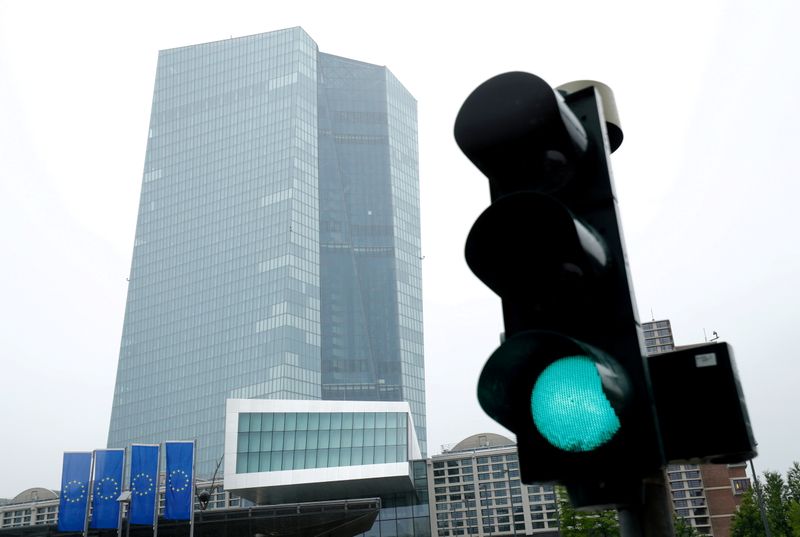By Philip Blenkinsop and Balazs Koranyi
BRUSSELS (Reuters) -The euro zone economy grew faster than expected in the second quarter, pulling out of a pandemic-induced recession, while the easing of coronavirus curbs also helped inflation shoot past the European Central Bank's 2% target in July.
The European Union's statistics office Eurostat said on Friday that its initial estimate showed gross domestic product (GDP) in the 19 countries that use the euro had expanded 2.0% in April-June from the previous quarter.
Compared to the same period a year earlier, when lockdowns to slow the spread of the coronavirus brought economic activity close to a standstill, GDP jumped 13.7%.
But unlike the U.S. and Chinese economies, which have pulled above their pre-pandemic peaks, the euro zone economy remains some 3% smaller than it was at the end of 2019.
Eurostat also said euro zone inflation accelerated to 2.2% in July from 1.9% in June - the highest rate since October 2018 and above the 2.0% mean expectation of economists.
Economic growth also surpassed a Reuters poll forecast of 1.5% for the April-June quarter and a 13.2% annual increase.
Among the outperformers were the euro zone's third and fourth largest economies, Italy and Spain, with quarterly growth respectively of 2.7% and 2.8%. Portugal's tourism-heavy economy expanded by 4.9%.
Since the start of 2020 the euro zone has twice suffered two consecutive quarters of contraction - defining a technical recession - with coronavirus curbs hitting most recently in the period spanning the end of 2020 and the start of 2021.
Activity was dragged down in the first three months of this year largely by weakness in Germany, where a lockdown from November had curbed private consumption.
Europe's biggest economy returned to growth in the second quarter, but the expansion of 1.5% compared to Q1 showed a weaker rebound than expected.
The French economy, the euro zone's second largest, grew by 0.9%, just ahead of forecasts, with its third lockdown gradually being eased from May.
The strong growth could add to arguments for the ECB to start scaling back its crisis fighting measures.
The central bank's 1.85 trillion euro ($2.20 trillion) Pandemic Emergency Purchase Programme is due to expire in March at the earliest, and policy hawks are already arguing that it is time to start tapering purchases given the bloc's rebound.
Policy doves are warning that the more transmissible Delta variant poses a threat to the recovery, however, so the ECB's Sept. 9 meeting is too early for a firm call on winding down the scheme early next year.
SIMILAR Q3 GROWTH SEEN
Bert Colijn, senior economist at ING, said supply chain problems were likely to have hampered growth in Germany, with its large auto industry, while Italy and Spain saw impressive growth because they were further behind pre-pandemic levels.
Even with the Delta variant and continued supply chain issues, ING expects growth across the bloc to be 2% again in the third quarter.
"Despite all the greening efforts, the euro zone economy continues to perform like a diesel engine: it takes a while to get going but don't underestimate it once it's picked up steam," Colijn said.
Capital Economics saw third-quarter growth of a little over 2%, which would still leave the euro zone economy smaller than before the pandemic.
"Germany should reach that (pre-pandemic) benchmark in the second half of the year, but we don't expect the southern economies to do so until well into 2022," its chief Europe economist Andrew Kenningham wrote in a note.
Figures on Thursday showed the U.S. economy grew at a slower than expected 6.5% annualised rate in the second quarter, pulling GDP above its pre-pandemic peak, as massive government aid and vaccinations fuelled spending on goods and services.
The equivalent euro zone rate was 8.3%.
For inflation, energy prices were again the driving factor, rising 14.1% in July compared to a year before.
Without the volatile energy and unprocessed food components, or what the European Central Bank calls core inflation, prices rose 0.9% year-on-year, the same as in June. Economists had expected a dip to 0.7%.
ECB policymakers have already warned of a temporary spike in inflation and made clear they will not adjust policy as the one-off factors behind the rise, such as higher oil prices, are likely to fade next year.
Inflation could even reach 3% by year-end before falling back, with core inflation more subdued.
The ECB promised a longer period of easy policy when it unveiled a new strategy earlier this month, as beyond this spike, inflation is likely to languish below its target for years to come.
Eurostat also said euro zone unemployment fell in June to 7.7% of the workforce, or 12.517 million people, from an upwardly revised 8.0% in May, or 12.940 million people. Economists had expected a jobless rate of 7.9%.
($1 = 0.8412 euros)
